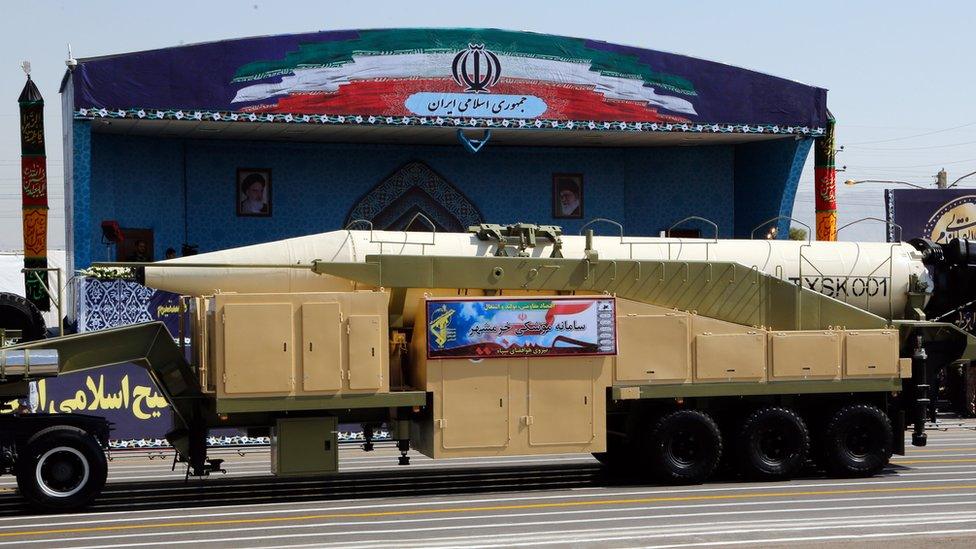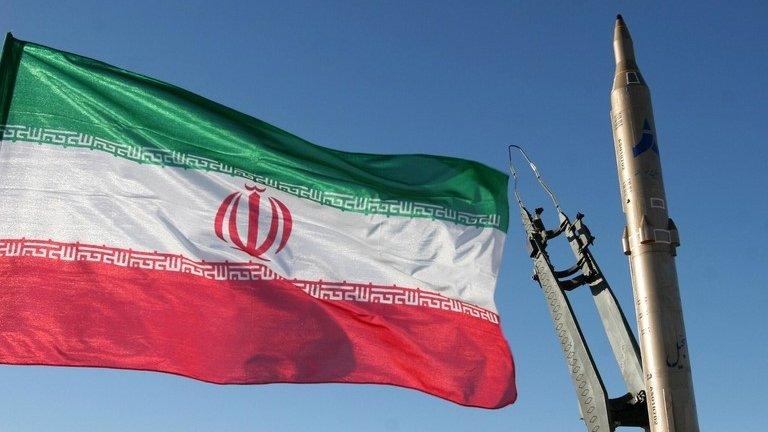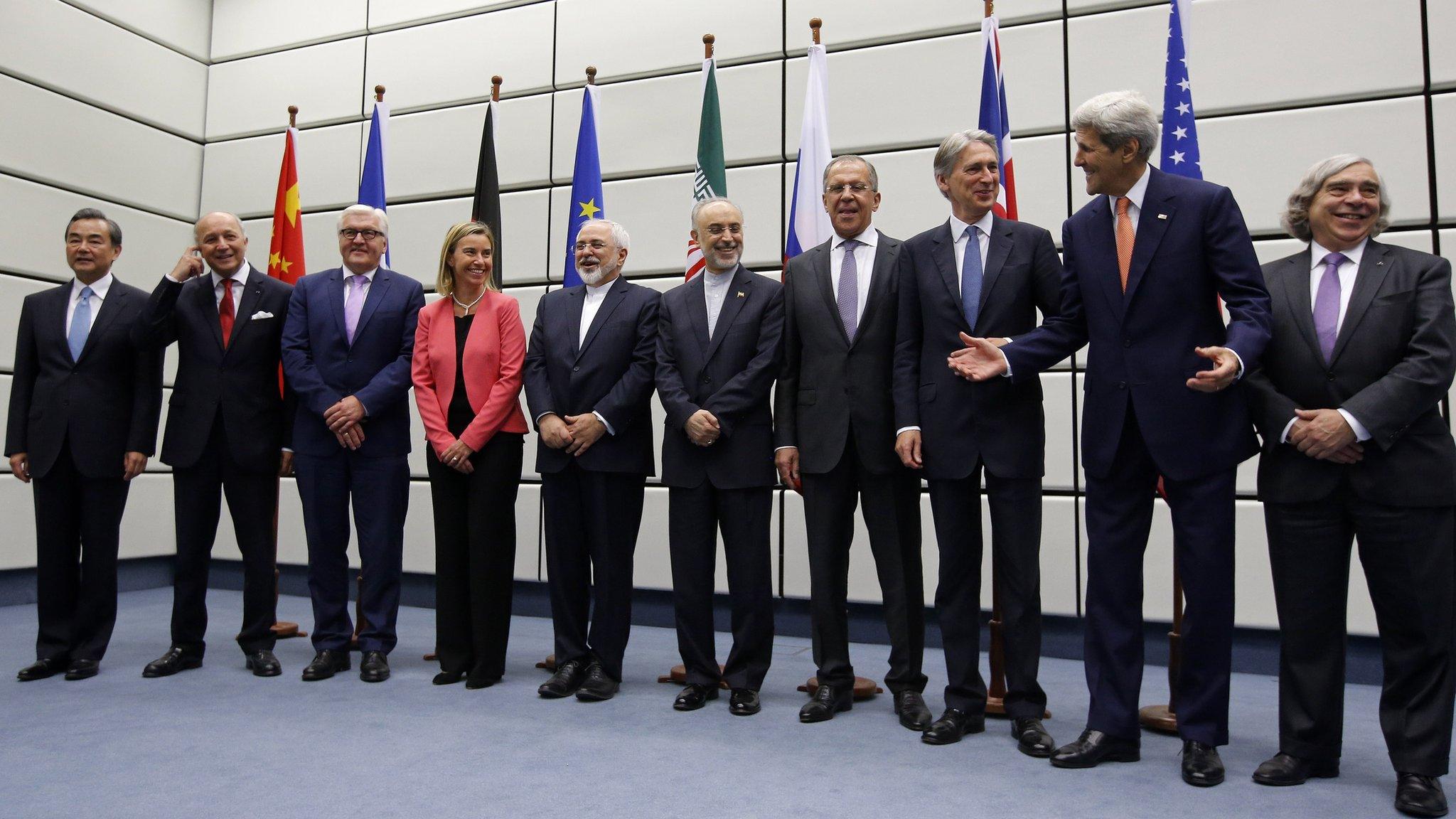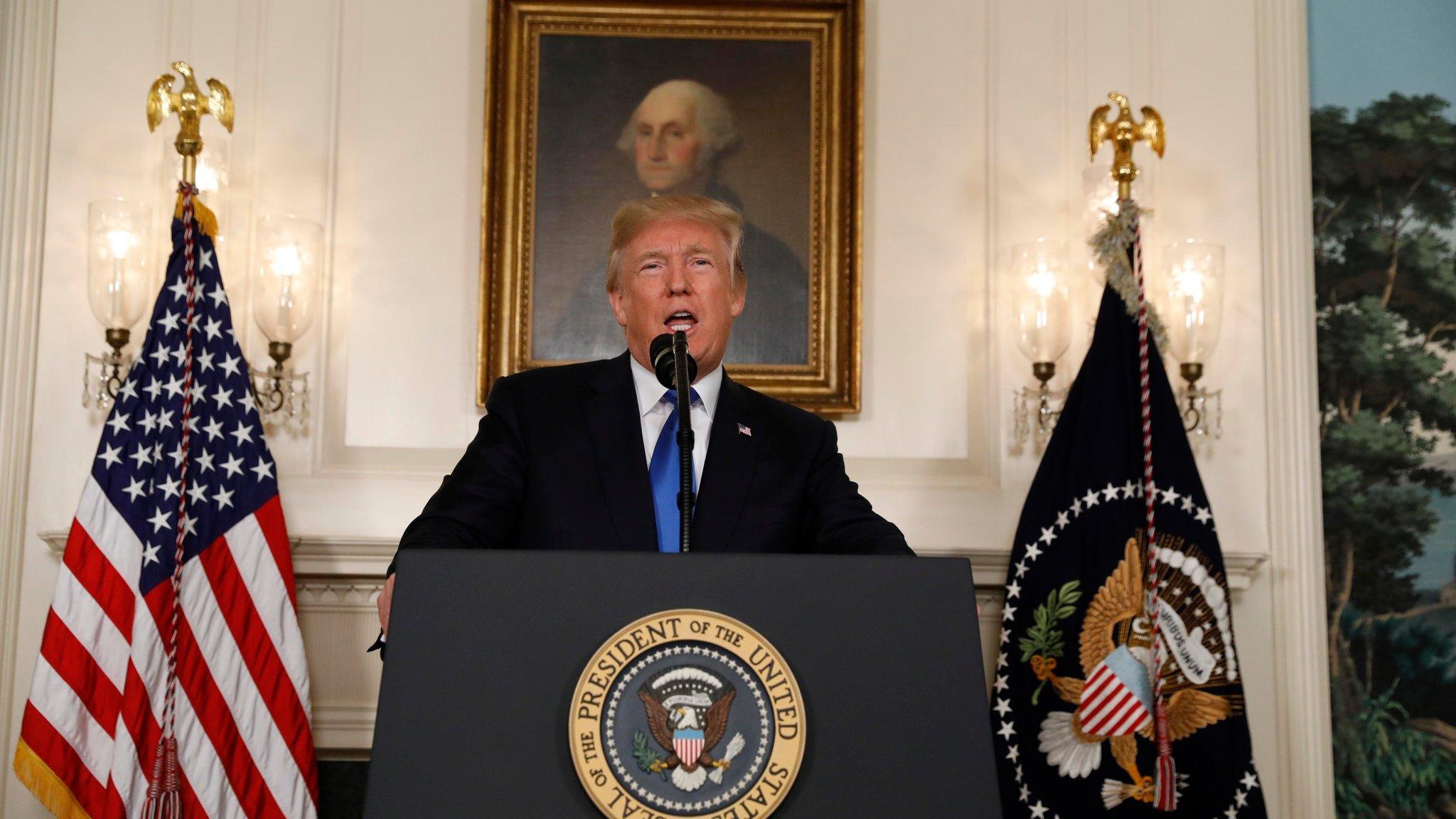Iran nuclear deal: European powers urge US not to withdraw
- Published
Boris Johnson on Iran nuclear deal: 'I don't think anybody has come up with a better idea'
European powers have urged the US not to abandon the 2015 agreement with Iran that limits its nuclear programme, saying it is making the world safer.
After meeting his Iranian, French, German and EU counterparts in Brussels, UK Foreign Secretary Boris Johnson insisted the deal was preventing Iran from acquiring nuclear weapons.
He also challenged Washington to come up with a better alternative.
US President Donald Trump wants to amend the deal or withdraw from it.
In October, he refused to recertify for Congress that Iran was complying, accusing it of "not living up to the spirit" of the agreement.
Why does Europe back the deal?
At a news conference after meeting Iranian Foreign Minister Mohammad Javad Zarif on Thursday, representatives of the EU, the UK, France and Germany reiterated their support for the nuclear deal they helped negotiate, external.
"The deal is working; it is delivering on its main goal, which means keeping the Iranian nuclear programme in check and under close surveillance," EU foreign policy chief Federica Mogherini said.
"The unity of the international community is essential to preserve a deal that is working, that is making the world safer and that is preventing a potential nuclear arms race in the region. And we expect all parties to continue to fully implement this agreement."
Allow X content?
This article contains content provided by X. We ask for your permission before anything is loaded, as they may be using cookies and other technologies. You may want to read X’s cookie policy, external and privacy policy, external before accepting. To view this content choose ‘accept and continue’.
Mr Johnson described the deal, which is known formally as the Joint Comprehensive Plan of Action (JCPOA), as a "considerable diplomatic accomplishment".
"I don't think that anybody has produced a better alternative to the JCPOA as a way of preventing the Iranians from going ahead with the acquisition of a military nuclear capability," he said. "It is incumbent on those who oppose the JCPOA to come up with that better solution, because we have not seen it so far."
Iran's foreign ministry said on Tuesday that if the US withdrew from the agreement, it was ready to give an "appropriate and heavy response".
What does Mr Trump want to change?
The US president declared in October that the agreement was "one of the worst and most one-sided transactions the United States has ever entered into", external, and warned that within a few years Iran would be able to "sprint towards a rapid nuclear weapons breakout".
He accused Iran of committing "multiple violations" and promised to work with Congress to "address the deal's many serious flaws".
Mr Trump said they included the deal's "sunset clauses", one of which allows for the lifting of restrictions on Iran's uranium enrichment programme after 2025.
He also wants to give the International Atomic Energy Agency access to Iranian military sites, and for the deal to cover Iran's ballistic missile programme.
A timeline of what Trump has said about the Iran deal
Critics of the deal in Congress have also proposed amending legislation to ensure that US sanctions would "snap back" automatically if Iran carried out certain actions.
On Friday, Mr Trump is set to decide whether to extend relief for Iran from some US economic sanctions.
The sanctions, which were suspended in 2016, had cut Iran's central bank out of the international financial system and imposed penalties for buying Iranian oil.
US officials told the Associated Press on Wednesday that Mr Trump was expected to extend the sanctions relief for another 120 days, external. But they said he might also impose new, targeted sanctions on Iranian businesses and people allegedly involved in missile tests, supporting terrorism, and human rights abuses.
On Thursday, US Treasury Secretary Steve Mnuchin said he thought President Trump would impose new sanctions on Iran.
"I am expecting new sanctions on Iran," he told reporters. "We continue to look at them. We've rolled them out and I think you can expect there will be more sanctions coming."
Why is Iran's missile programme controversial?
The US and EU say Iranian ballistic missile tests conducted in the past year have violated UN Security Council resolution 2231, which endorsed the nuclear deal.
The resolution calls upon Iran not to "undertake any activity related to ballistic missiles designed to be capable of delivering nuclear weapons, including launches using such ballistic missile technology".

Iran rejects US assertions that its ballistic missiles are designed to carry nuclear warheads
Iran says the missiles it has tested are not designed to carry nuclear warheads and insists its nuclear programme is entirely peaceful.
The European ministers expressed serious concern about Iran's ballistic missile programme, external, as well as its alleged transfer of missiles and assistance to non-state entities in the Middle East. But they said the issue should be kept separate from the nuclear deal.
- Published4 January 2018

- Published23 November 2021

- Published13 October 2017
